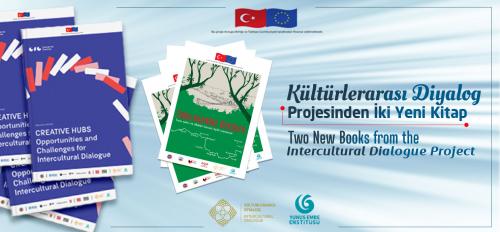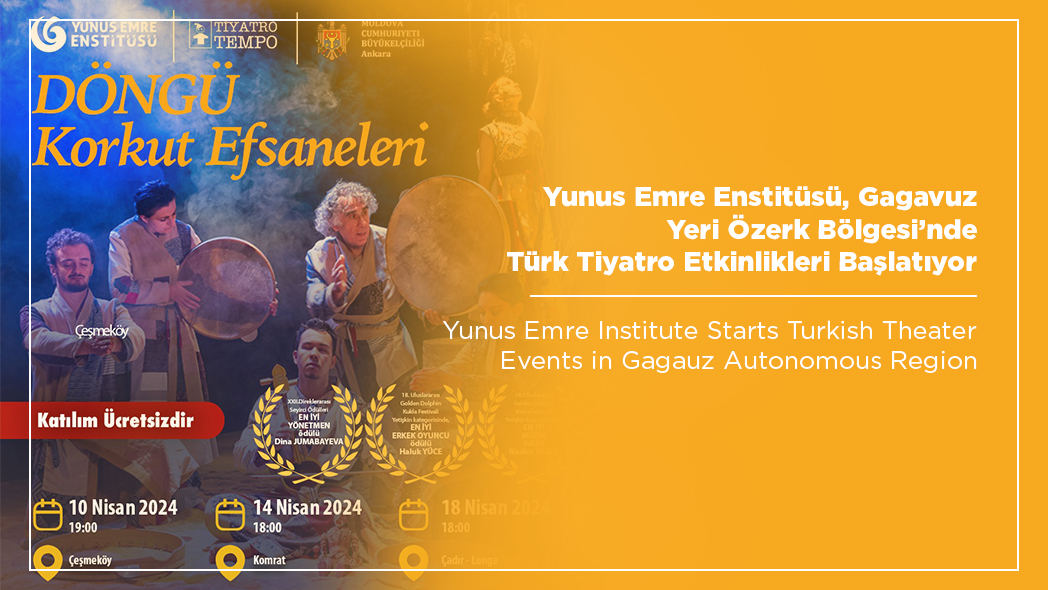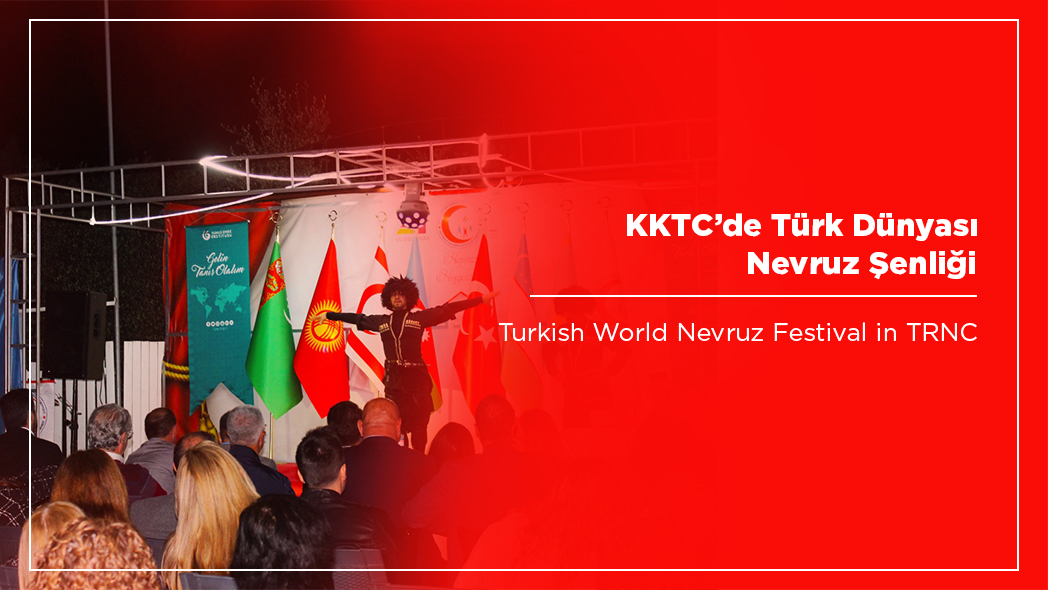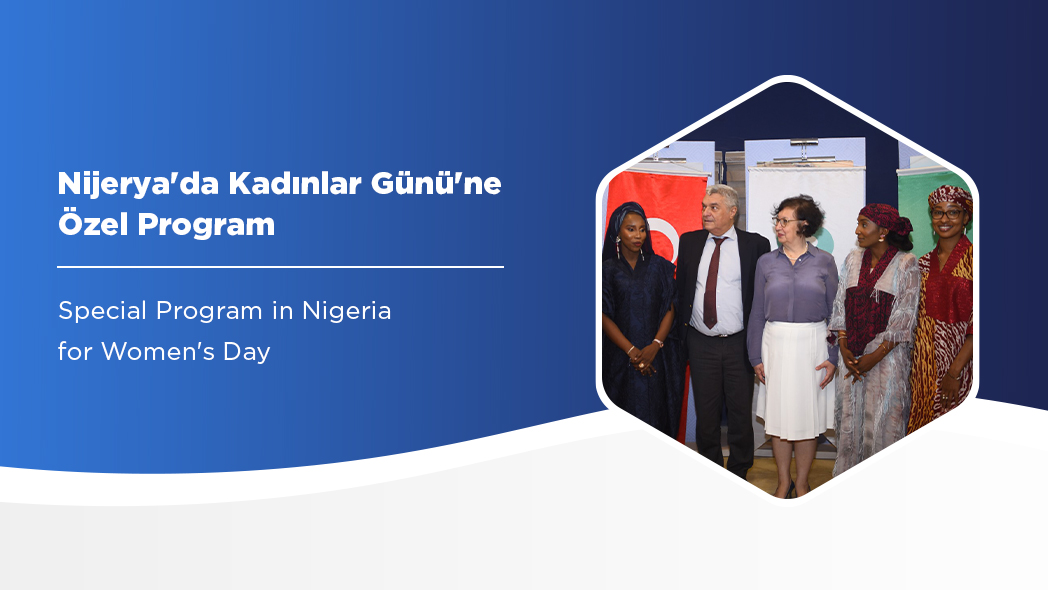Two New Books from the Intercultural Dialogue Project
Two books have emerged out of the projects undertaken as part of the EU-Turkey Intercultural Dialogue Programme. A report for the study entitled "Creative Hubs: Opportunities and Challenges for Intercultural Dialogue," conducted with more than 400 people within the scope of the 'Connect for Creativity' project, has been published. The second outcome of the Intercultural Dialogue Programme has come from the project entitled "Diversity in Unity: Intercultural Dialogue Through the Waves of Danube." The first 10 stories selected at the competition "Stories on the Danube," held under the project, will be published in Hungarian, Turkish and English.
The Intercultural Dialogue Programme (ICD), led by Yunus Emre Institute as an organization conducting Turkey's cultural affairs in the international platform, is providing donations to the projects that bring diverse institutions from different geographies together to reinforce mutual understanding and cooperation. |
The Intercultural Dialogue Programme (ICD), led by Yunus Emre Institute as an organization conducting Turkey's cultural affairs in the international platform, is providing donations to the projects that bring diverse institutions from different geographies together to reinforce mutual understanding and cooperation.
Two books have emerged out of the projects undertaken as part of the EU-Turkey Intercultural Dialogue Programme.
The Intercultural Dialogue Programme (ICD), led by Yunus Emre Institute as an organization conducting Turkey's cultural affairs in the international platform, is providing donations to the projects that bring diverse institutions from different geographies together to reinforce mutual understanding and cooperation. A report for the study entitled "Creative Hubs: Opportunities and Challenges for Intercultural Dialogue," conducted with more than 400 people within the scope of the 'Connect for Creativity' project, supported by the ICD programme, has been published. The report describes how to make the best use of the future opportunities for cooperation in the field of creative economy and sheds light on the ways to strengthen intercultural dialogue through creative platforms and creativity.
The second outcome of the Intercultural Dialogue Programme has come from the project entitled "Diversity in Unity: Intercultural Dialogue Through the Waves of Danube." The first 10 stories selected at the competition "Stories on the Danube," held under the project, will be published in Hungarian, Turkish and English. These 10 stories will also be published as audiobooks and included in Storytel.
CREATIVE ECONOMY IN TURKEY AND EUROPE
Connect for Creativity sheds lights on the creative economy sphere in Turkey and Europe. The study, conducted by Cardiff University Creative Economy team with 400 people during a five-month period, focuses on four countries, namely the United Kingdom, Serbia, Turkey and Greece. |
The report for the study conducted within the framework of the British Council-led Connect for Creativity project having Abdullah Gül University and ATÖLYE from Turkey, Nova Iskra from Serbia and BIOS from Greece as its partners focuses on the role of the creative hubs in strengthening intercultural dialogue. Being the first study that focuses on intercultural dialogue among the research on creative economy, "Creative Hubs: Opportunities and Challenges for Intercultural Dialogue" has been conducted in cooperation with Cardiff University Creative Economy team. The report unfurls the creative economy sphere in Turkey and Europe.
SOCIAL RELATIONS IN CREATIVE HUBS STRENGTHEN INTERCULTURAL DIALOGUE
Connect for Creativity sheds lights on the creative economy sphere in Turkey and Europe. The study, conducted by Cardiff University Creative Economy team with 400 people during a five-month period, focuses on four countries, namely the United Kingdom, Serbia, Turkey and Greece.
Connect for Creativity aims to form a network of creative hubs across Europe to foster creative exploration and collaboration that contributes to building a more cohesive, open and connected civil society, and the study conducted in line with this aim turns the spotlight on the creative economy sphere in Turkey and Europe. The study, conducted by Cardiff University Creative Economy team with 400 people during a five-month period, focuses on four countries, namely the United Kingdom, Serbia, Turkey and Greece. As a result of the interviews conducted with the managers and members of the creative hubs, academics, local private and public stakeholders as well as the workshops held with experts in these countries, the current situation has been clearly portrayed. In the study, ATÖLYE from Turkey, BIOS from Greece, Nova Iskra from Serbia and Rabble Studio from the United Kingdom were examined in detail as four sample cases. It was found that 75 percent of the participants advocate the value added by creative hubs to intercultural dialogue.
CREATIVE HUBS TRIGGER ECONOMIC GROWTH
The study's findings clearly demonstrated that the importance of creative hubs in the development of creative and digital communities and growth of the economies in their respective countries is increasing. |
The study's findings clearly demonstrated that the importance of creative hubs in the development of creative and digital communities and growth of the economies in their respective countries is increasing.
The study's findings clearly demonstrated that the importance of creative hubs in the development of creative and digital communities and growth of the economies in their respective countries is increasing. It was found that while the significant and value of the social relations established in creative platforms are acknowledged, the power of the interaction networks whose boundaries go beyond the hub members to reach out to civil society is yet to fully understood. Of the participants, 75 percent stated that they believe that creative hubs contribute to intercultural dialogue and provide environments that develop and enable this dialogue. In the four countries included in the study, 38 different groups exhibiting cultural diversity with which creative hubs interact have been identified. It was further determined that the creative hubs under study have international ties with 56 countries. In line with these findings, it was demonstrated that intercultural dialogue results in various benefits not only for creative hubs and their members, but also for other relevant stakeholders, policy makers and society.
NEED TO ACCESS TO FINANCING, KNOWLEDGE AND SKILLS
The social impact of creative hubs may occasionally be ignored by the managers, members or stakeholders of the hubs. It is believed that the reason for this is that the impact in question constitutes a less emphasized portion of the strategic plans or operations or it is a novel method for measuring the value or contribution. It is stated that the basic factors for the evaluation, development and future success of creative hubs are listed as the access to financing, knowledge and skills and support from the partners for the realization of this.
CREATIVITY AND COMPETENCE FOR INTERCULTURAL WORK AS MOST IMPORTANT LABOR SKILLS
Creativity and competence for intercultural work are listed by the Institute for the Future as among the ten most important labor skills for the future. The most successful economies and communities of the 21st century will be those having the most creative characteristics thanks to their contributions to welfare and innovation. |
Creativity and competence for intercultural work are listed by the Institute for the Future as among the ten most important labor skills for the future. The most successful economies and communities of the 21st century will be those having the most creative characteristics thanks to their contributions to welfare and innovation.
In connection with the research report, Cherry Gough, the Director of the British Council in Turkey, stressed the importance of creative industries as follows: "During the last decade, creative industries have made into the strategic plans of many countries and acquired an important position. This success is attributed the important position of creative hubs and accompanying creative communities. Creativity and competence for intercultural work are listed by the Institute for the Future as among the ten most important labor skills for the future. The most successful economies and communities of the 21st century will be those having the most creative characteristics thanks to their contributions to welfare and innovation."
GROWTH TARGETED IN NEW BUSINESS MODELS
Gough asserted that the British Council is actively lending support to creative industries and hubs everywhere around the world. "Acting in collaboration with policy makers, creative skills and communities, we developed strong creative economies that have long-term ties with the United Kingdom, and that look forward to the future. We attach importance to encouraging cooperation in culture, entrepreneurship and digital technology, thereby speeding up the growth observed in research and development (R&D) and new business models," he said.
INTERCULTURAL DIALOGUE TO BE STRENGTHENED BY REPORT'S FINDINGS
Understanding intercultural dialogue has never been so important. Better understanding the potential of creative hubs to concentrate on this matter in an effective and strategic manner allows concentration on the conditions that will support and enable this in the future. The report entitled "Creative Hubs: Opportunities and Challenges for Intercultural Dialogue" encourages us to think about how to make the best use of the opportunities for future cooperation. Having taken the first step to better understand the underlying concepts of how creative hubs create intercultural dialogue, Connect for Creativity aims to use the research findings for providing the partners and stakeholders with concrete recommendations.
The research report is accessible at the website www.connectforcreativity.eu.
STORIES ON THE DANUBE TO BE PUBLISHED IN THREE LANGUAGES
The first 10 stories selected at the competition that seeks to consolidate the cultural assets of the countries bordering the Danube with common history will be published under the name of "Stories on the Danube" in Hungarian, Turkish and English. |
The first 10 stories selected at the competition that seeks to consolidate the cultural assets of the countries bordering the Danube with common history will be published under the name of "Stories on the Danube" in Hungarian, Turkish and English.
The literature competition "Stories on the Danube: the Danube and its Countries" was one of the several intercultural dialogue events that seek to consolidate the cultural assets of the countries bordering the Danube with common history. The first 10 stories selected within the framework of the Diversity in Unity: Intercultural Dialogue Through the Waves of Danube, a project implemented as part of the EU-Turkey Intercultural Dialogue Programme, will be published under the name of "Stories on the Danube" in Hungarian, Turkish and English. These 10 stories will also be published as audiobooks and included in Storytel.
The results of the competition were announced last years and Ceren Türkkan's story had come in first. The other story writers whose stories will be published include (alphabetically) Ayşe Karlıdağ Süzer, Ayşe Şen, Burak Özdemirci, Cihat Gemici, Ezgi Özbek Şenel, Feyime Özgür, Işıl Çelikel, Mert Çetin and Ramazan Uğur Baranlı.
Ceren Türkkan will also be invited to Budapest International Book Fair in 2020.
The applications for the competition had ended on October 9, and the winners had been announced at Yaşar University on October 25, 2019. The unpublished stories by the participants aged above 18 and below 30 had been accepted for the competition and there were applications from various cities in Turkey.





